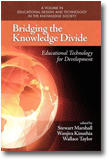
Bridging the Knowledge Divide
Educational Technology for Development
Edited by:
Stewart Marshall, The University of the West Indies
Wanjira Kinuthia, Georgia State University
Wallace Taylor, The University of the West Indies
A volume in the series: Educational Design and Technology in the Knowledge Society. Editor(s): Stewart Marshall, The University of the West Indies. Wanjira Kinuthia, Georgia State University.
Published 2009
In many international settings, developing economies are in danger of declining as the digital divide becomes the knowledge divide. This decline attacks the very fabric of cohesion and purpose for these regional societies delivering increased social, health, economic and sustainability problems. The examples in this book will provide leaders, policy developers, researchers, students and community with successful strategies and principles of ICT use in education to address these needs.
This book will discuss how educational technology can be used to transform education and assist developing communities to close the knowledge divide. It will provide comprehensive coverage of educational technology in development in different professions and parts of world. The book will provide examples of best practice, case studies and principles for educators, community leaders, researchers and policy advisers on the use of educational technology for development. In particular, it will provide examples of how education can be provided more flexibly in order to provide access to hitherto disadvantaged communities and individuals.
CONTENTS
Foreword. Biographical Notes on the Editors. Biographical Notes on the Authors. Acronyms. Introduction: Bridging the Knowledge Divide: Educational Technology for Development, Stewart Marshall, Wanjira Kinuthia, and Wal Taylor. SECTION 1: FLEXIBLE EDUCATION FOR EMPOWERMENT. Flexible Education and Community Development, Martin Franklin and Roger Hosein. Flexible Learning for Community Economic Development, Haaveshe Nekongo-Nielsen. Contribution of the IDE in Promoting Gender Equality and in Empowering Women in Swaziland, C. W. S. Sukati, Esampally Chandraiah, and Nokuthula T. Vilakati. A Virtual Wheel of Fortune?: Enablers and Constraints of ICTs in Higher Education in South Africa, Laura Czerniewicz and Cheryl Brown. Delivering Distance Education for the Civil Service in the UK: The University of Chester’s Foundation for Government Program, Jon Talbot. SECTION 2: MANAGING AND COMMUNICATING KNOWLEDGE. Knowledge Management Strategies for Distance Education, Neil Butcher. The Effectiveness of Mobile Short Messaging Service (SMS) Technologies in the Support of Selected Distance Education Students of Makerere University, Uganda, Richard Kajumbula. The Impact of Video Conferencing on Distance Education Courses: A University of Namibia Case Study, Trudie Frindt. Open Resources for Open Learning in Developing Countries: Deciphering Trends for Policies, Quality, and Standards
Considerations, Wanjira Kinuthia. Freedom, Innovation, and Equity with Open Source Software, Richard Wyles. Copyright Issues and their Impact on Flexible Education in Africa, Pauline Ngimwa. SECTION 3: FLEXIBLE DELIVERY IN HIGHER EDUCATION. University Education for National Development: Makerere University’s Dual Mode Experience, Jessica N. Aguti. Considerations for Higher Education Distance Education Policy for Development: A Case of the University of Botswana, Judith W. Kamau. Blended Online and Face-to-Face Learning: A Pilot Project in the Faculty of Education, Eduardo Mondlane University, Xavier Muianga. Evaluating the Impact of CABLE: A Cognitive Apprenticeship-Based Learning Environment, Ioana Chan Mow, Wing Au, and Greg Yates. From Distance Learning to E-learning in Central and Northern Mozambique, Aurelio Gomes and Elizabeth
Walker. A Framework for the Delivery of Cross-Regional Distance Education to Professionals in Developing Countries, Kim I. Mallalieu and Pamela Collins. Distance Learning—Challenges and Opportunities for Postgraduate Medical Education: A Case Study of Postgraduate Training in Family Medicine Using Distance Learning at the University of the West Indies (2001–2006), Pauline Williams-Green, Affette McCaw-Binns and Tomlin Paul. SECTION 4: PREPARING TEACHERS USING FLEXIBLE APPROACHES. Preservice Teacher Preparation and Effective eLearning, Susan Crichton and Gail Shervey. Distance Teacher Training in Rwanda: Comparing the Costs, Alison Mead Richardson. Beckoning E-Learners through Exploration of Computer Technology, Pier Angeli Junor Clarke. Educational Technology and Flexible Education in Nigeria: Meeting the Need for Effective Teacher Education, Nwachukwu Prince Ololube and Daniel Elemchukwu Egbezor. Fostering Digital Literacy of Primary Teachers in Community Schools: The BET K–12 Experience in Salvador de Bahia, Lorenzo Cantoni, Francesca Fanni, Isabella Rega, and Stefano Tardini.
REVIEWS
"...I can imagine this useful text being read and valued by several audiences, from researchers and leaders who work in international contexts, to teachers and graduate students on the ground in developing countries..." Michele Jacobsen in Education Review (Read full review)
"[this book] is a tremendous contribution to the new trend of distance education which is still under discussion in many universities and educational institutions all over the world." A. Ait Si Mhamed Canisius College in Intl Rev Education
-
Paperback978-1-60752-109-9
Web price: $62.04 (Reg. 72.99)
-
Hardcover978-1-60752-110-5
Web price: $89.24 (Reg. 104.99)
- eBook9781607521839

- EDU015000 - EDUCATION: Higher
- EDU037000 - EDUCATION: Research
- EDU001000 - EDUCATION: ADMINISTRATION: General
-
 (Re)Envisioning Social Studies Education Research
Current Epistemological and Methodological Expansions, Deconstructions, and Creations
(Re)Envisioning Social Studies Education Research
Current Epistemological and Methodological Expansions, Deconstructions, and Creations
-
 Cases 'n' Places
Global Cases in Educational and Performance Technology
Cases 'n' Places
Global Cases in Educational and Performance Technology
-
 Educational Technology in Practice
Research and Practical Case Studies from the Field
Educational Technology in Practice
Research and Practical Case Studies from the Field
-
 Institutional Diversity in American Postsecondary Education
Institutional Diversity in American Postsecondary Education
-
 On the Move
Mobile Learning for Development
On the Move
Mobile Learning for Development
-
 Promoting Equitable Classroom Practices in Higher Education
Approaches Beyond Curriculum
Promoting Equitable Classroom Practices in Higher Education
Approaches Beyond Curriculum
-
 The Handbook for Aspiring Higher Education Leaders
The Handbook for Aspiring Higher Education Leaders

